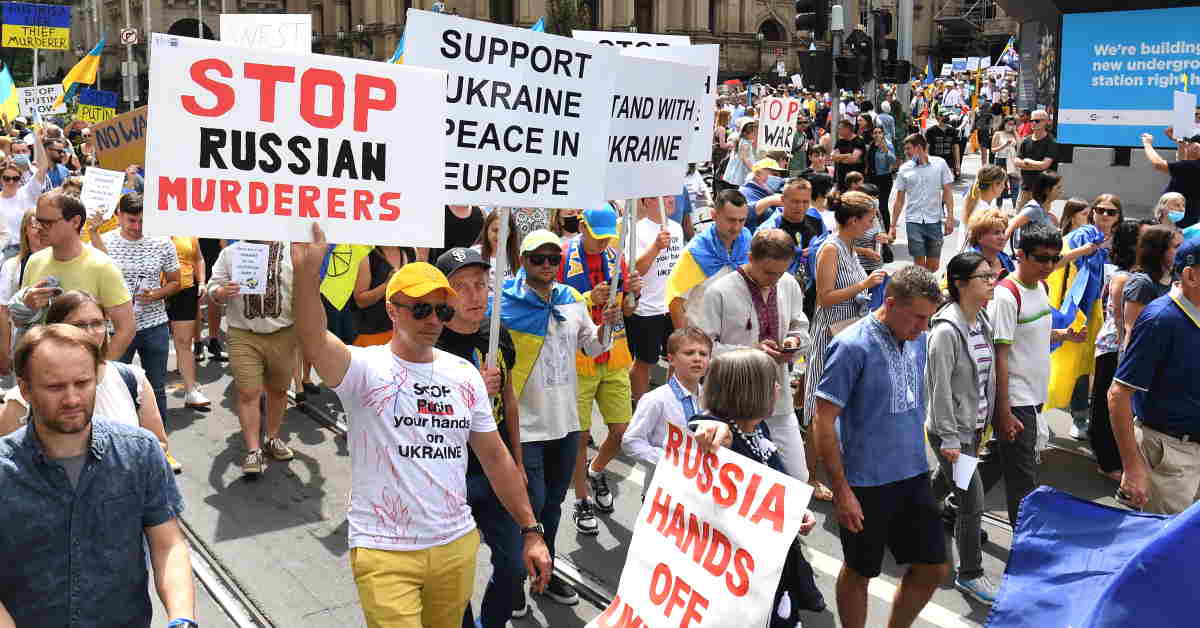On 18 February, 2022, six Filipino nationals from Ukraine arrived in the country after the Philippine government announced free repatriation flights for Filipinos living in the crisis-driven Eastern European state.
The Department of Foreign Affairs (DFA) has estimated more than 350 Filipinos living in Ukraine. The DFA continues to monitor the situation of Filipinos in Ukraine while the Philippine Embassy in Poland remains in touch with the Filipino community inside Ukraine.
Moreover, during the initial onslaught of the Russian invasion, the Philippine Stock Exchange index (PSEi) had traded down. Philippine shares fell with the heightened geopolitical tensions in Eastern Europe, which could go down further depending on the possible impact of tighter monetary policy and potentially aggressive United States (US) Federal Reserve rate hikes.
True enough, the Philippines may be far from Ukraine; nonetheless, what's going on in that part of the world is affecting the country and the rest of the world without exception.
The possible further escalation of the Ukraine crisis poses a threat not only to Europe's economic and financial stability but to the world at large.
Economic Consequences
Weighing on what's going on in the eastern side of Europe, the key question now is what are possible economic consequences to countries across the world with the prospect of war in Europe looming on the horizon, if, in any case, the Ukraine crisis escalates further into a full-blown war?
Though there are indeed no winners in war, only losers, in the eventuality that a full-blown war breaks out in Europe, it will impact energy markets. Still, the US is not the primary loser in all this, but Europe and the rest, particularly the developing world. Why?
The US has natural gas, and shale oil production. To a considerable degree, the US has been self-sufficient in energy for some time now. While it imports oil; it is not dependent on other countries for energy.
On the contrary, Europe will most likely be the most affected region if a war breaks in its midst in the same manner that the developing world will also be adversely affected.
With the impending sanctions against Russia imposed by the West, taking into consideration that part of these sanctions that the US puts forward against Russia is shooting down the US$10 billion Nord Stream 2, a gas pipeline which is supposed to deliver natural gas from Russia to Germany, and noting that Europe is heavily dependent on Russia for natural gas, it is Europe which will most likely bear the crunch. Germany in particular will be adversely affected. Russia supplies natural gas to Germany, and more than one-half of German coal imports comes from Russia.
Hence, the most crucial question is, what's the impact of energy and trade sanctions on Russia? How all these will impact the world, especially on oil and even wheat prices?
Russia is the world’s third-largest petroleum producer. It is the second largest producer of natural gas globally, accounting for nearly 17 percent of supply in 2020. It exports more than 35 percent of its production, and about 70 percent is delivered to Europe by pipeline, with much of it passing through Ukraine. The largest is Nord Stream 1, with 55 cubic metres per annum capacity.
Russia is not only one of the world's most significant suppliers of fertilizer and related raw materials, but it is among the world's top exporters of oil, natural gas, copper, aluminium, palladium, sulphur, and other essential commodities. To note, Russia accounted for 1.9 percent of global trade in 2020, down from 2.8 percent in 2013, according to World Bank data.
Russia and Ukraine produce nearly a quarter of the world's wheat, a vital ingredient used to make bread, pasta, and the like. Russia and Ukraine are also leading suppliers of barley, sunflower seed oil, and corn, among others.
According to J P Morgan, a supply disruption could elicit a price rally in European natural gas prices similar to that in late December (2021). This would also impact the price of oil, as countries would likely switch away from natural gas: "Any disruptions to oil flow from Russia in a context of low spare capacity in other regions could easily send oil prices to US$120 bbl. A halving of Russian oil exports would likely push Brent oil price to $150 bbl."
Furthermore, the looming ramifications of the Ukraine crisis and its possible escalation is the so-called inflationary crunch, which relates to heaving commodity prices because of potential disruptions in the global supply chain.
Disturbance in the global supply chain in this context pertains to the disruptions in the exports of goods like wheat, petroleum, natural gas, coal, and even fertilizers from Ukraine and Russia to the global market or other countries, especially countries dependent on imports of these goods for their consumptions. In what sense may this happen or even be possible?
The current military tensions in Ukraine threatens to severe the international shipments of goods like wheat, natural gas, oil (petroleum) from Russia and Ukraine to the global market, which may create shortages and push the price of these goods higher than usual because of disruptions in the worldwide supply chain.
One possible cause of the disruptions in the global supply chain is if ports, airports, and railroads have been damaged and international flights and travel are cancelled. Thus, if hampered, the transport of goods from Ukraine and even from Russia to the international market will negatively impact the global supply chain.
And if all these events happen, many countries dependent on the imports of goods from both Ukraine and Russia, like North Africa, Middle East countries, and even European countries themselves, who rely on wheat, natural gas, oil imports, and the like from Russia and Ukraine will bear the brunt and most definitely will be unfavourably affected.
Thus, the forthcoming and possible disruptions of the global supply chain brought about by military tensions in Ukraine could drive up energy and wheat prices in Asia and in the Philippines even higher, which will push up the prices of essential goods and commodities. In turn, weakening the purchasing power of consumers.
Such a situation may also give rise to social unrest as people become more desperate to survive. Most importantly, all these events will negatively impact the economic recovery of countries like the Philippines from the COVID-19 pandemic.
The Ukraine crisis and its economic impact, no doubt, taken together, is like a double whammy for developing countries like the Philippines, which are trying to bounce back from the devastating economic effects of the COVID-19 pandemic.
Lessons For Asia And The Philippines
Being aware of the economic consequences brought about by the Ukraine crisis is one thing but drawing lessons from the experience of Ukraine is something that is of great value and deserves consideration.
In an online webinar held on 23 February, 2022 with the theme, Ukraine Crisis: Analyses and What's Lessons for Asia, Mr. Herman Laurel, the President of Philippines-BRICS Strategic Studies, expressed that in Asia, the US had used the Philippines as its Ukraine in the disputed South China Sea (SCS) through the EDSA I (People Power) regime change operation ousting a fledgling geopolitically –independent, economic development and modernization-oriented government, and imposing anti-development, liberalizing, deregulating and privatizing regimes – until President Rodrigo R Duterte changed the equation.
Laurel said that President Duterte sinks the US Pivot to Asia by reversing the course of events between China and the Philippines from mutually defeating conflict and destabilization of Asia towards mutually beneficial dialogue, cooperation, and trade stabilizing Asia for continuing economic construction and prosperity.
According to Laurel, Filipinos should begin to comprehend and assist in building the "One World, One Family" vision that the recently concluded Beijing Winter Olympics exalted as its closing message. However, he also emphasized that there are still some Filipino personalities, and he calls them "Amchurian" candidates and officials seeking to restore US warmongering.
Conclusion
The Philippines should avoid the fate of Ukraine. The country should refuse and prevent at all costs the possibility of being a proxy or a pawn of any superpower in their proxy wars. It must avoid being used as a pawn by any superpower to encircle another superpower.
We should avoid being in the frontline of any military confrontation and competition consequential to the power struggle of the superpowers, which is not to our advantage, and not in line with the country's core national interests.
Similarly, amid the volatile and ever-changing geopolitical realities in the Indo-Pacific region and other parts of the globe, ASEAN must be an association that promotes peace, progress, stability, and most importantly, remains a nuclear-free zone.
Likewise, ASEAN member states must be consistent and steadfast in upholding ASEAN Centrality in matters such as regional security architecture, regional order, and the power dynamics between external powers that have interests in the region.
The only way for the Ukraine Crisis to come to a halt is for the US and NATO not to ignore Russia's security demands and concerns, for Ukraine to be neutral, for negotiations, dialogues, and for diplomacy to resume before it's too late.
Ukraine and Russia must go back to the negotiating table for the sake of their people and the world. The world cannot afford another world war while it is still trying to recover from the COVID-19 pandemic.
The views expressed in this article are the author’s own and do not necessarily reflect those of The ASEAN Post.

